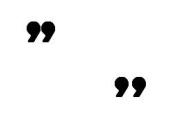When you are writing assignments, it is extremely important that you do not copy from course materials, books, journal articles, book reviews, the Internet "ÃÂ in fact, any source that you have not written yourself! To copy is called plagiarism, and this occurs when: * the writer copies the writing of someone else word for word * the writer does not acknowledge who the writer is with a reference * the writer does not acknowledge where the writing can be found.
Many cases of plagiarism are unintentional, but this is no excuse. It is important that you develop a system of notetaking that enables you to recognise when the notes are in your own words, and when they are quotations from the work of others. I tend to assume that notes I write from books are the words of others, unless I have written a note to myself to say that they are not! In order to write a good essay, you will need to use small extracts from the texts that you look at.
There are two rules for this: * they must be brief * they must be attributed by a reference.
If you want to use small extracts from the texts that you refer to, there are some RULES that you must follow. These rules will ensure that you are not guilty of plagiarism.
QUOTATIONS Probably the best rule to remember about using quotations is that if you can use your own words to describe something, then do! However, you should think about using short quotations when: * you want to show your reader exactly what someone else has said * you want to use the words as evidence to illustrate the point you are making.
For example, if you are studying sociology, you may need to quote words or phrases from the texts you are analysing and discussing. Whatever your reasons, however, you MUST follow the rules below: * Use single quotation marks "ÃÂ "ÃÂ' to enclose the quoted words. Double quotation marks (""ÃÂ) are speech marks. If used in quotations, they mark off a quotation that is contained within the passage you are quoting.
* If you are using a quotation of longer than about 40 words, it should be indented from the margin. You should also omit the quotation marks.
* Each quotation should come with a reference. The system of referencing at Brunel is the Harvard referencing system. This gives you two options: 1. you can either put the reference in brackets immediately after naming the original source, or: 2. you can use a number with a numbered reference at the bottom of your page, or at the end.
* Your quote should be exactly the same as the phrase in the book, including any punctuation marks. If you want to add a quotation of your own in the middle of a quotation for clarity, then you should put [] square brackets around it.
* If you want to leave a word or phrase out from a quotation, then you should indicate this by putting three dots in place of the word or phrase, e.g. "æ * You should try to introduce a quotation by linking it into the phrasing of your own writing. You should introduce a quotation with a phrase of your own, and then follow this with either a comma , or a colon.

